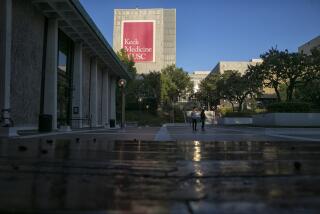Ex-UCI Scientist Admits Study’s Errors
- Share via
A former UC Irvine scientist under scrutiny in a campus ethics inquiry on Thursday conceded misstatements in a research article that was used to promote nutritional supplements in which he had a financial interest.
Dr. Darryl See, a Huntington Beach physician once considered a promising researcher in infectious diseases at UCI’s medical school, quit last year following admitted research improprieties.
Now UCI is investigating a study See published early this year in which he purported to still be on the medical school faculty. The article, in the Journal of the American Nutraceutical Assn., cites research See reported having conducted in part at the medical school.
As chief author of the article, See reported subjecting 196 natural products ranging from bugleweed to shark cartilage to a battery of tests, evaluating their effects on cell enhancement, antioxidant activity and antiviral functions.
Medical school officials say they have no record of the research. They are now questioning whether he may have conducted experiments on human blood samples without securing the proper permission from research authorities at the university, or whether he performed the work at all.
An investigative team comprising UCI faculty from outside the medical school is now reviewing all of See’s earlier work, UCI Medical School Dean Tom Cesario said this week.
On Thursday, editors of the association’s journal posted a letter on their Web site in which See acknowledged errors in the study, including the outdated affiliation with UCI.
In the letter, See confirmed news reports that he was a paid consultant to a company that later used the study to promote its products. He also confirmed that his wife sells several products that appear in the study.
See also retracted an earlier claim that funding from the National Institutes of Health supported the research.
Despite the misstatements and omissions, “the conclusions of the study remain unchanged,” See wrote in his letter to the journal.
The journal’s editors say they became aware of questions about See’s work late last week.
“It’s embarrassing,” said journal co-editor Allen Kratz, a former pharmacology professor. “We’re doing what we can to internally make sure this won’t happen again.”
See graduated from UCI’s medical school in 1986 with honors. After a residency in internal medicine and a three-year fellowship in infectious diseases at the university, he joined the faculty.
“He really was a very bright individual who did very well up until about two or three years before he left,” said a former colleague who worked with See and is familiar with his work.
See’s research at UCI focused on treatment of viral diseases. He resigned from the faculty in September 1998 after a review panel determined that he had violated research procedures, including using patients’ blood samples without obtaining authorization from school officials and using inappropriate procedures on laboratory animals.
See now has a practice in Huntington Beach. Among the offerings at his Institute of Longevity Medicine--also known as Jeunesse Inc.--are beauty treatments and dietary supplements. Business cards at the office still identify See as an associate professor.
See could not be reached for comment. Staff members at his office said Wednesday he is in Europe, as is his associate, Dr. Ferre Akbarpour. The staff refused to answer questions about his practice or provide information on the services See provides.
With some 3,500 members, the Montgomery, Ala.-based American Nutraceutical Assn. is meant to educate health care professionals and the public on the use of dietary supplements, which association executive director Allen Montgomery said can “provide support for the body through herbs and vitamins and minerals.”
“Nutraceuticals” is a marketing term, not a scientific word, for such supplements, Montgomery said.
The Journal of the association is not well known by the mainstream scientific community, experts say.
Gail Harrison, associate director of UCLA’s Center for Human Nutrition, said she has never heard of the association or its journal and was unfamiliar with See’s work.
But there is a need for good research on the effects of dietary supplements, she said.
Regulations may limit what claims can be made about supplements, but “there is not a great deal of limitation on what can be marketed,” Harrison said. “As a result, a great deal of things that are finding their way to the market . . . haven’t been tested.”






